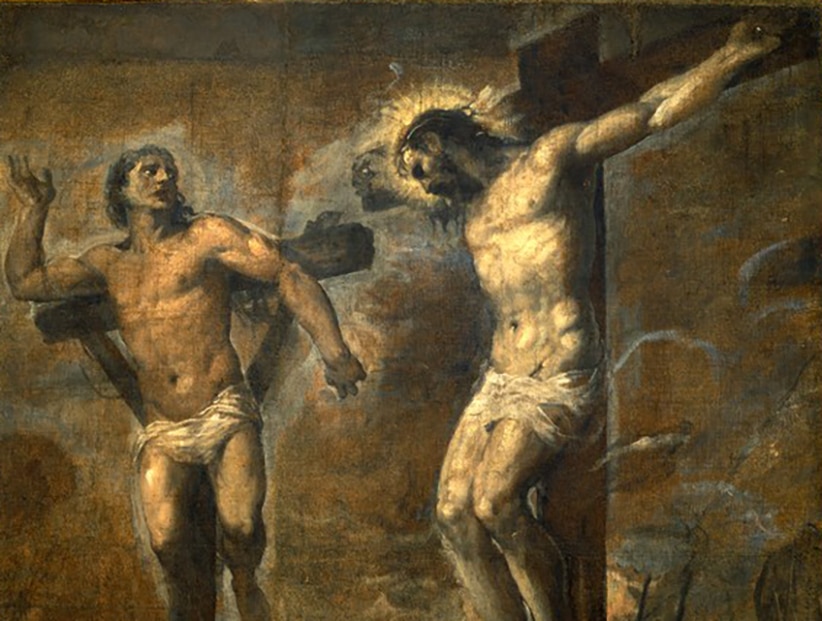The heart of the Father is rich in mercy, and he is now calling every human being on the face of the earth to a change of heart. “Repent!” was the first word out of the Lord’s mouth in his public preaching, “and believe in the gospel” (Mt 4:17; Mk 1:15). The Gospel is the happy announcement that the good God who loves us is now calling us into his divine Life. He has given us his Son Jesus Christ, he has given us his Holy Spirit, and he has given us his Church so that we might go to him into the Father’s house — into the heart of the Father who loves us beyond all we could ever ask or imagine. Yet, there is no other way to go than by the pathways of metanoia.
“Amen, I say to you, today you will be with me in Paradise.” (Lk 23:43)
The Second Last Word
Metanoia is a Greek word that means transformation of the mind. Normally, it is translated as “repentance.” In either case, it stands for a change at the core of the person. When the Lord Jesus proclaims the Gospel, he not only tells us of the Father’s incomprehensible love, he not only calls us to receive that love, but he also insists upon repentance. For metanoia or repentance is precisely how you and I receive the Father’s merciful love. It is impossible for anyone to enter the Father’s house without opening one’s own heart to the Father and walking away from sin.
The good thief
One of the greatest examples in all of Scripture is the good thief. Something great takes place between the Lord and the good thief, and the story is found in the Gospel of Luke 23:39-43. Yet, to see the full grandeur of what St. Luke tells us, one must also take into account what Matthew and Mark tell us in their Gospels, as well. Matthew and Mark both tell us that Jesus was crucified along with two thieves (cf. Mt 27:44; Mk 15:32). Matthew and Mark concur that both thieves reviled Jesus. Luke, however, says that one thief reviled Jesus, but the other thief did the opposite. The good thief professes the innocence and kingly authority of Jesus (cf. Lk 23:41-42). At first glance, it seems like the Gospel accounts contradict each other. Did both thieves revile Jesus or just one of them?
The Fathers of the Church noticed the issue, and to harmonize the Gospels, some of the Fathers drew a certain very illuminating conclusion. It must have been that at first the good thief was reviling Jesus too, but at some later point during his crucifixion, he had a real change of heart toward Jesus — a conversion.
Process of repentance
This interpretive conclusion of the Fathers corresponds perfectly with what we see in the story of the good thief in the Gospel of Luke. The words of the good thief, both to his fellow thief and to Jesus, together display all the elements of a heart going through the process of repentance. The story of the good thief is a repentance tale in “real time” so to speak. How does it go?
The story begins with one thief questioning Jesus in mockery: “Are you not the Messiah? Save yourself and us” (Lk 23:39). The other thief then corrects him: “Have you no fear of God?” The Old Testament tells us many times that “the beginning of wisdom is fear of the LORD” (Prv 9:10). The fear of the Lord is the first step on the road to conversion. Simply by raising the question of the fear of the Lord, the good thief reveals how the topic has recently been on his mind. Though his body has nailed to a cross, in the depths of his heart he has taken his first step on the pathways of metanoia.
The good thief then takes a second step. Still speaking to his fellow thief, he confesses his guilt when he says, “We have been condemned justly, for the sentence we received corresponds to our crimes” (Lk 23:41). There is no repentance without a humble admission of sins and faults. So long as you and I live in a state of denial and rationalization of our sins, transformation of our minds is not taking place. Our hearts remain right where they are and go nowhere. Where there is acknowledgment and admission of sin and fault, however, a change of heart begins. A new and better way of life — with the help of God’s grace — opens up before our eyes. But the good thief goes further than simply admit his sin.
The good thief takes a third step when he makes a profession of faith in Jesus. Still speaking to his fellow thief, the good thief professes the innocence of Jesus: “this man has done nothing criminal” (Lk 23:41). In sacred Scripture, innocence and holiness go together. By professing the innocence of Jesus, the good thief in effect also professes the holiness of Jesus. Surely Jesus overheard this dialogue between the two thieves.
Surely Jesus detected the good thief’s newly formed faith, and also detected even some apologetic intent in the heart of the good thief. Yet, the transformation of the good thief’s mind and heart was not yet complete. At this point in the story, the good thief had turned against his own sins, had professed a certain faith about the holiness of Jesus, and even defended Jesus against mockery, but his conversion was far from complete. He had not yet turned toward Jesus personally.
Yet, grace was at work in his heart. After addressing his fellow thief, the good thief then shifts to speaking to Jesus. The shift is no mere plot requirement, but symbolizes something profound going on in his heart. His heart turns towards Jesus personally, and he makes one of the humblest and most soul-stirring appeals for love and mercy in all of Scripture: “Jesus, remember me when you come into your kingdom” (Lk 23:42).
Profession of faith
In these words, the good thief does two things at once. First, he makes an even more explicit profession of faith. He tells of his faith in the kingly power of Jesus, but now the good thief tells of his faith in Jesus to Jesus. A real dialogue between him and Jesus has begun. Second, the good thief professes the kind of faith that really gives birth to hope. By believing in both the goodwill and the kingly power of Jesus, the good thief really expects Jesus to do something. The good thief does not expect Jesus to take him down from the cross, but expects something far better. He expects Jesus to bring him into the kingdom — into the kingdom of love.
Prior to hearing from the good thief, the Lord Jesus obviously overheard the dialogue between the two thieves. Jesus observed the good thief’s fear of the Lord, observed his admission of sin, and observed his acceptance of due punishment. Once the good thief turns to Jesus, however, Jesus does not simply observe his appeal for love and mercy or observe his expectation to be brought into the kingdom. Rather, Jesus received it. Jesus received his heartfelt plea and his hope. Jesus received him. For Jesus replied to the good thief with one of the most moving words in all of Scripture: “Amen, I say to you, today you will be with me in Paradise” (Lk 23:43).

Paradise in the teaching of Jesus
In Scripture, today often symbolizes eternity. In Psalm 2:7, God says: “You are my son, today I have begotten you” (Ps 2:7). Today does not mean this calendar day. Rather, the letter to the Hebrews tells us this verse prophetically reveals the eternal Father speaking to his eternal Son (cf. Heb 1:5, 5:5). Today means “from eternity I have begotten you.” Similarly, when Jesus says to the good thief “today you will be with me” it means “in eternity you will be with me.”
“You will be with me in Paradise,” says the Lord. It is impossible for anyone to imagine what Paradise really is, but the Maronite Catholic liturgy abounds in ancient descriptions of it. “In the Paradise of Light and the place of radiant joy,” it says, “all the saints are glorified, Mary and the patriarchs, the prophets, apostles, martyrs, and the just who are loved by God.” The same Maronite liturgy also sings of the dwelling places of the just and the abodes of the victorious on high, and prays that we, too, might go to that bright place where the light of God shining on the face of Jesus Christ will fall upon us. All of this comes to those who walk the pathways of metanoia — life in the Father’s house.
What was it that converted the good thief? Surely, he observed how differently the Lord Jesus acted under crucifixion. Roman historians tell us that men normally went to crucifixion fighting for their lives like wild beasts, but the Gospels tell us that Jesus went like a lamb led to the slaughter. Normal men went cursing their executioners, but Jesus prayed for the forgiveness of his. The placard on the cross of Jesus said he was the king of the Jews, and, ironically, it was the Gospel truth. The word of the placard and the remarkable goodness and merciful love of Jesus on display towards all were an adequate evangelization for the good thief. In the depth is heart, the light of grace illuminated it all, and amid death, he saw in Jesus his last chance at life. He received the grace of conversion. May it be so for all of us as well.





